Atheism: Exploring Historical Perspectives, Implications, and Debates
VerifiedAdded on 2023/06/10
|6
|1274
|71
Essay
AI Summary
This essay examines the historical relationship between religion and atheism, tracing the development of atheism from ancient times through the Renaissance and the rise of rationality. It explores the social and political implications of atheism, including the persecution of atheists by religious authorities and the evolving distinctions between religious and non-religious communities. The essay further discusses varying definitions and implications of atheism, touching on concepts like skepticism, secularism, and the role of materialism in shaping non-belief. It analyzes key arguments for and against atheism, highlighting the complexities and debates surrounding the concept, and the relationship between atheism and secularism. The essay also explores the ethical and societal implications of atheism, including its impact on human values and social order. The essay includes references to scholarly work and direct quotes from notable figures and texts to support its claims.
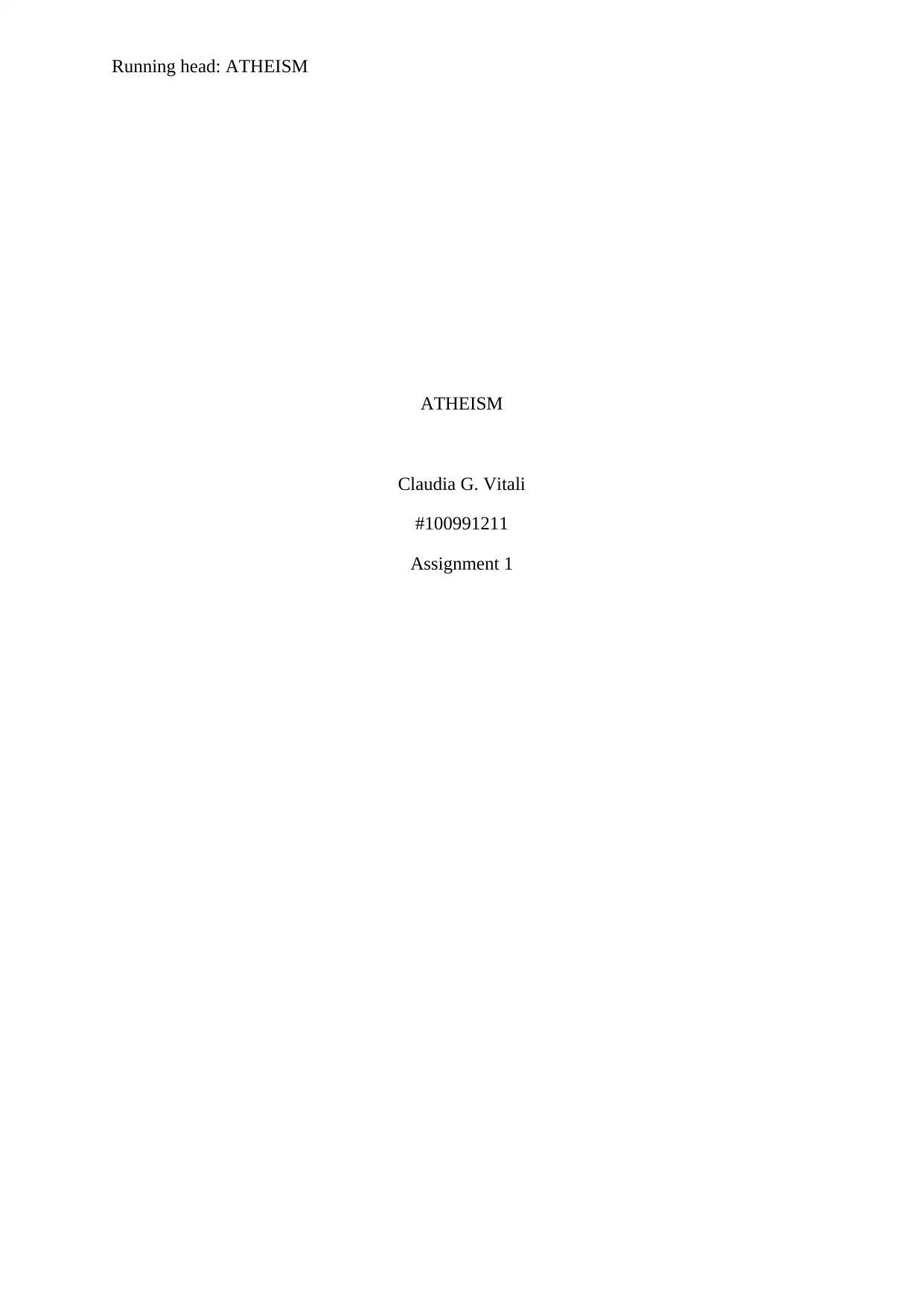
Running head: ATHEISM
ATHEISM
Claudia G. Vitali
#100991211
Assignment 1
ATHEISM
Claudia G. Vitali
#100991211
Assignment 1
Paraphrase This Document
Need a fresh take? Get an instant paraphrase of this document with our AI Paraphraser
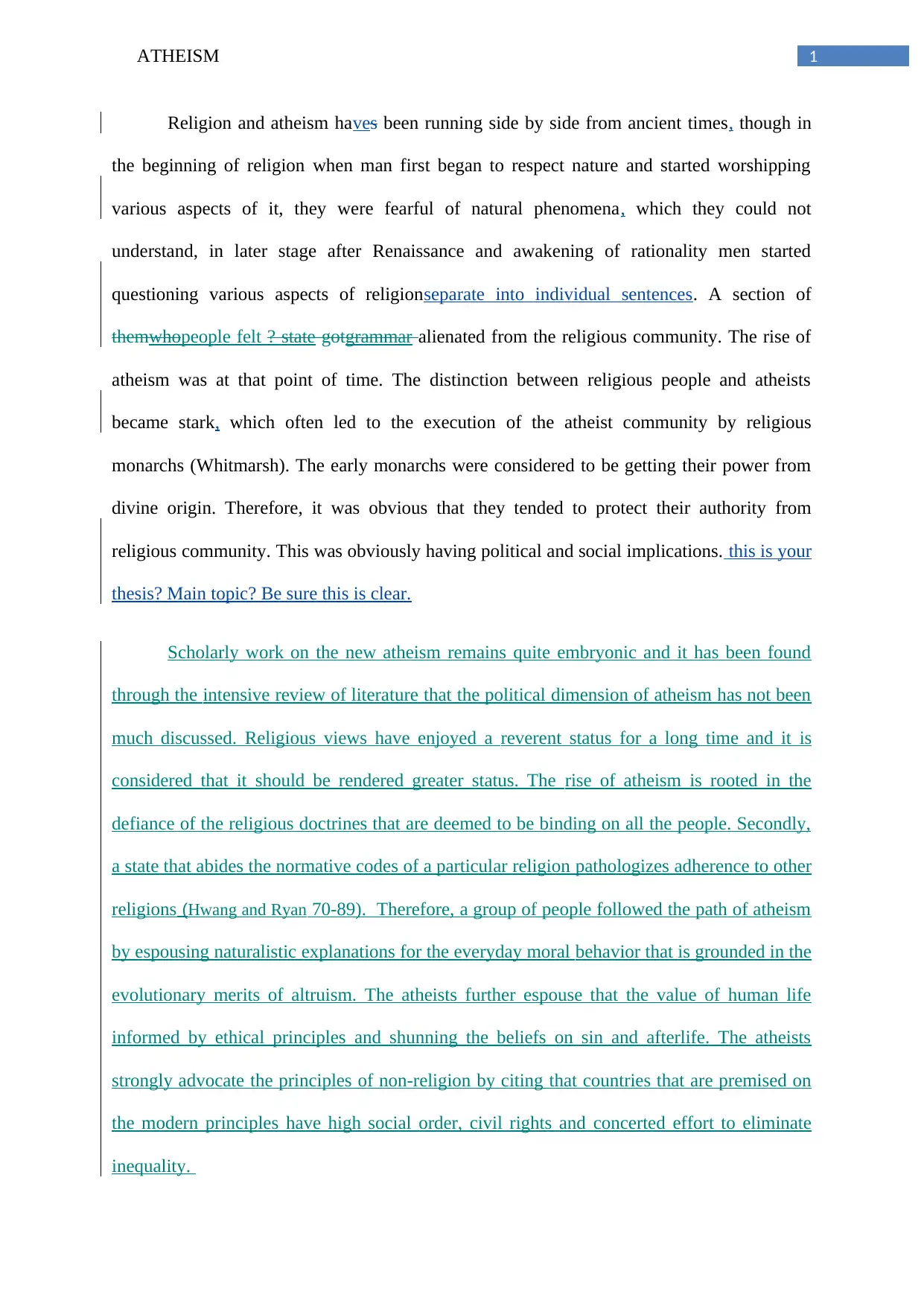
1ATHEISM
Religion and atheism haves been running side by side from ancient times, though in
the beginning of religion when man first began to respect nature and started worshipping
various aspects of it, they were fearful of natural phenomena, which they could not
understand, in later stage after Renaissance and awakening of rationality men started
questioning various aspects of religionseparate into individual sentences. A section of
themwhopeople felt ? state gotgrammar alienated from the religious community. The rise of
atheism was at that point of time. The distinction between religious people and atheists
became stark, which often led to the execution of the atheist community by religious
monarchs (Whitmarsh). The early monarchs were considered to be getting their power from
divine origin. Therefore, it was obvious that they tended to protect their authority from
religious community. This was obviously having political and social implications. this is your
thesis? Main topic? Be sure this is clear.
Scholarly work on the new atheism remains quite embryonic and it has been found
through the intensive review of literature that the political dimension of atheism has not been
much discussed. Religious views have enjoyed a reverent status for a long time and it is
considered that it should be rendered greater status. The rise of atheism is rooted in the
defiance of the religious doctrines that are deemed to be binding on all the people. Secondly,
a state that abides the normative codes of a particular religion pathologizes adherence to other
religions (Hwang and Ryan 70-89). Therefore, a group of people followed the path of atheism
by espousing naturalistic explanations for the everyday moral behavior that is grounded in the
evolutionary merits of altruism. The atheists further espouse that the value of human life
informed by ethical principles and shunning the beliefs on sin and afterlife. The atheists
strongly advocate the principles of non-religion by citing that countries that are premised on
the modern principles have high social order, civil rights and concerted effort to eliminate
inequality.
Religion and atheism haves been running side by side from ancient times, though in
the beginning of religion when man first began to respect nature and started worshipping
various aspects of it, they were fearful of natural phenomena, which they could not
understand, in later stage after Renaissance and awakening of rationality men started
questioning various aspects of religionseparate into individual sentences. A section of
themwhopeople felt ? state gotgrammar alienated from the religious community. The rise of
atheism was at that point of time. The distinction between religious people and atheists
became stark, which often led to the execution of the atheist community by religious
monarchs (Whitmarsh). The early monarchs were considered to be getting their power from
divine origin. Therefore, it was obvious that they tended to protect their authority from
religious community. This was obviously having political and social implications. this is your
thesis? Main topic? Be sure this is clear.
Scholarly work on the new atheism remains quite embryonic and it has been found
through the intensive review of literature that the political dimension of atheism has not been
much discussed. Religious views have enjoyed a reverent status for a long time and it is
considered that it should be rendered greater status. The rise of atheism is rooted in the
defiance of the religious doctrines that are deemed to be binding on all the people. Secondly,
a state that abides the normative codes of a particular religion pathologizes adherence to other
religions (Hwang and Ryan 70-89). Therefore, a group of people followed the path of atheism
by espousing naturalistic explanations for the everyday moral behavior that is grounded in the
evolutionary merits of altruism. The atheists further espouse that the value of human life
informed by ethical principles and shunning the beliefs on sin and afterlife. The atheists
strongly advocate the principles of non-religion by citing that countries that are premised on
the modern principles have high social order, civil rights and concerted effort to eliminate
inequality.
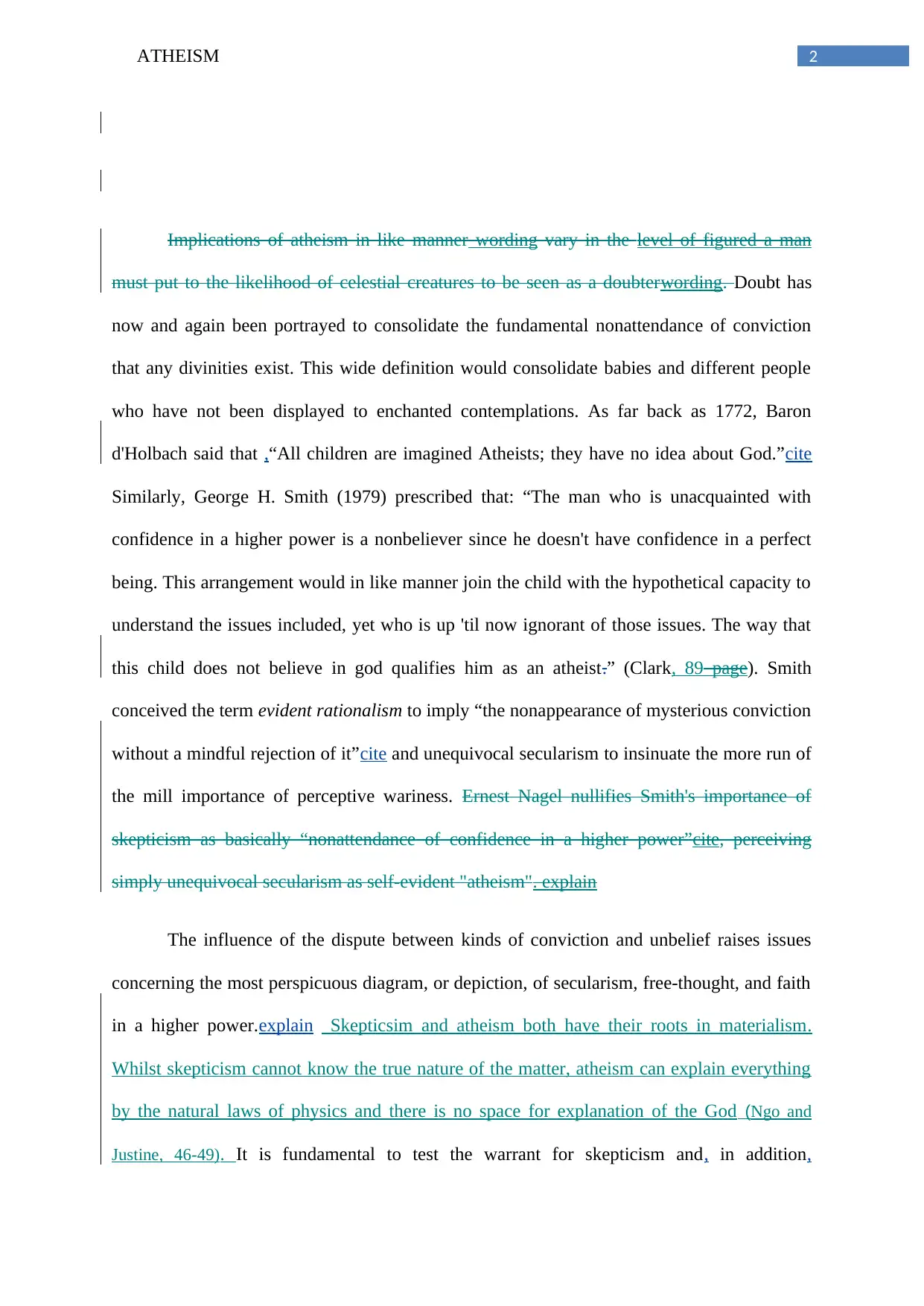
2ATHEISM
Implications of atheism in like manner wording vary in the level of figured a man
must put to the likelihood of celestial creatures to be seen as a doubterwording. Doubt has
now and again been portrayed to consolidate the fundamental nonattendance of conviction
that any divinities exist. This wide definition would consolidate babies and different people
who have not been displayed to enchanted contemplations. As far back as 1772, Baron
d'Holbach said that ,“All children are imagined Atheists; they have no idea about God.”cite
Similarly, George H. Smith (1979) prescribed that: “The man who is unacquainted with
confidence in a higher power is a nonbeliever since he doesn't have confidence in a perfect
being. This arrangement would in like manner join the child with the hypothetical capacity to
understand the issues included, yet who is up 'til now ignorant of those issues. The way that
this child does not believe in god qualifies him as an atheist.” (Clark, 89 page). Smith
conceived the term evident rationalism to imply “the nonappearance of mysterious conviction
without a mindful rejection of it”cite and unequivocal secularism to insinuate the more run of
the mill importance of perceptive wariness. Ernest Nagel nullifies Smith's importance of
skepticism as basically “nonattendance of confidence in a higher power”cite, perceiving
simply unequivocal secularism as self-evident "atheism". explain
The influence of the dispute between kinds of conviction and unbelief raises issues
concerning the most perspicuous diagram, or depiction, of secularism, free-thought, and faith
in a higher power.explain Skepticsim and atheism both have their roots in materialism.
Whilst skepticism cannot know the true nature of the matter, atheism can explain everything
by the natural laws of physics and there is no space for explanation of the God (Ngo and
Justine, 46-49). It is fundamental to test the warrant for skepticism and, in addition,
Implications of atheism in like manner wording vary in the level of figured a man
must put to the likelihood of celestial creatures to be seen as a doubterwording. Doubt has
now and again been portrayed to consolidate the fundamental nonattendance of conviction
that any divinities exist. This wide definition would consolidate babies and different people
who have not been displayed to enchanted contemplations. As far back as 1772, Baron
d'Holbach said that ,“All children are imagined Atheists; they have no idea about God.”cite
Similarly, George H. Smith (1979) prescribed that: “The man who is unacquainted with
confidence in a higher power is a nonbeliever since he doesn't have confidence in a perfect
being. This arrangement would in like manner join the child with the hypothetical capacity to
understand the issues included, yet who is up 'til now ignorant of those issues. The way that
this child does not believe in god qualifies him as an atheist.” (Clark, 89 page). Smith
conceived the term evident rationalism to imply “the nonappearance of mysterious conviction
without a mindful rejection of it”cite and unequivocal secularism to insinuate the more run of
the mill importance of perceptive wariness. Ernest Nagel nullifies Smith's importance of
skepticism as basically “nonattendance of confidence in a higher power”cite, perceiving
simply unequivocal secularism as self-evident "atheism". explain
The influence of the dispute between kinds of conviction and unbelief raises issues
concerning the most perspicuous diagram, or depiction, of secularism, free-thought, and faith
in a higher power.explain Skepticsim and atheism both have their roots in materialism.
Whilst skepticism cannot know the true nature of the matter, atheism can explain everything
by the natural laws of physics and there is no space for explanation of the God (Ngo and
Justine, 46-49). It is fundamental to test the warrant for skepticism and, in addition,
⊘ This is a preview!⊘
Do you want full access?
Subscribe today to unlock all pages.

Trusted by 1+ million students worldwide
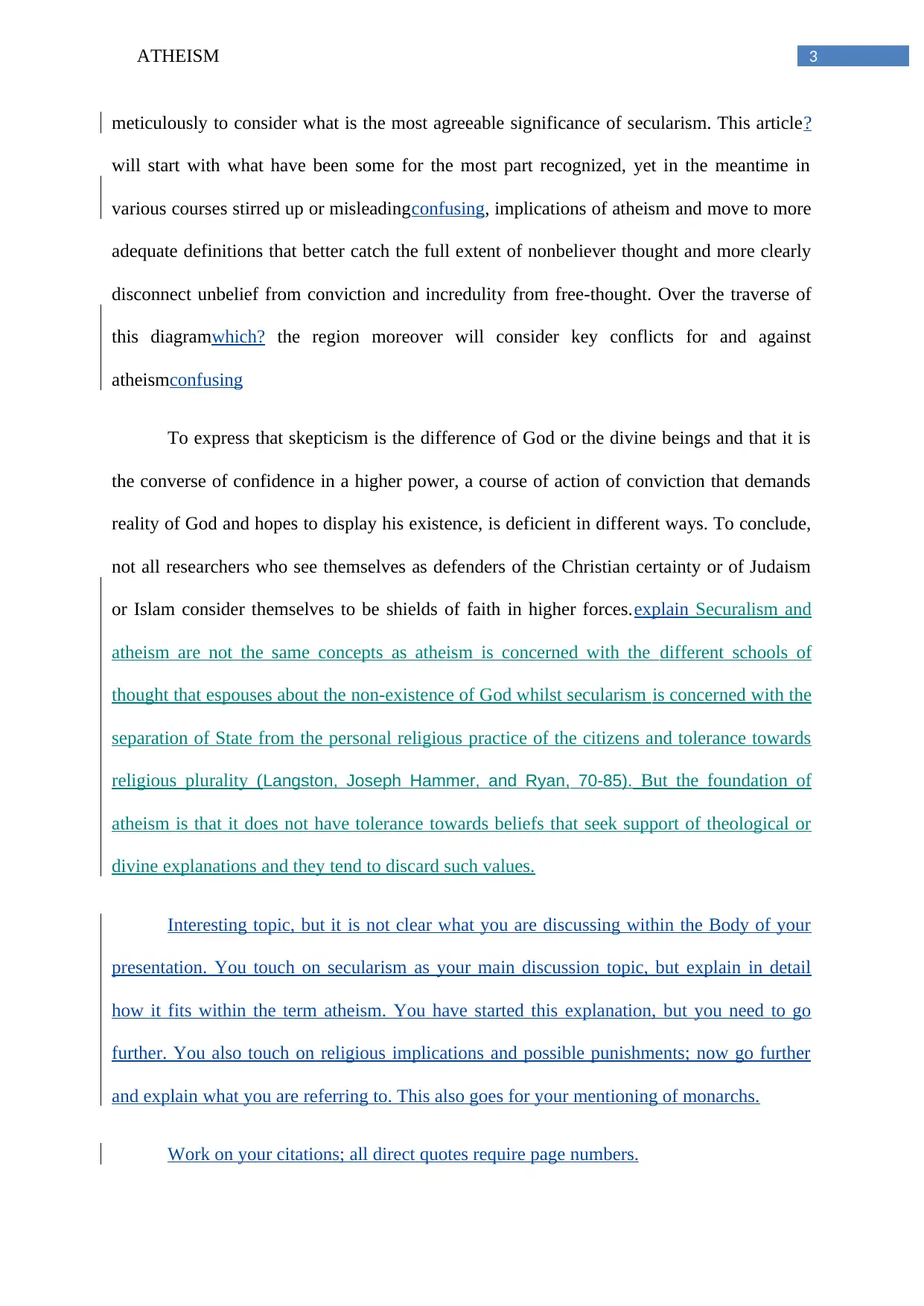
3ATHEISM
meticulously to consider what is the most agreeable significance of secularism. This article?
will start with what have been some for the most part recognized, yet in the meantime in
various courses stirred up or misleadingconfusing, implications of atheism and move to more
adequate definitions that better catch the full extent of nonbeliever thought and more clearly
disconnect unbelief from conviction and incredulity from free-thought. Over the traverse of
this diagramwhich? the region moreover will consider key conflicts for and against
atheismconfusing
To express that skepticism is the difference of God or the divine beings and that it is
the converse of confidence in a higher power, a course of action of conviction that demands
reality of God and hopes to display his existence, is deficient in different ways. To conclude,
not all researchers who see themselves as defenders of the Christian certainty or of Judaism
or Islam consider themselves to be shields of faith in higher forces.explain Securalism and
atheism are not the same concepts as atheism is concerned with the different schools of
thought that espouses about the non-existence of God whilst secularism is concerned with the
separation of State from the personal religious practice of the citizens and tolerance towards
religious plurality (Langston, Joseph Hammer, and Ryan, 70-85). But the foundation of
atheism is that it does not have tolerance towards beliefs that seek support of theological or
divine explanations and they tend to discard such values.
Interesting topic, but it is not clear what you are discussing within the Body of your
presentation. You touch on secularism as your main discussion topic, but explain in detail
how it fits within the term atheism. You have started this explanation, but you need to go
further. You also touch on religious implications and possible punishments; now go further
and explain what you are referring to. This also goes for your mentioning of monarchs.
Work on your citations; all direct quotes require page numbers.
meticulously to consider what is the most agreeable significance of secularism. This article?
will start with what have been some for the most part recognized, yet in the meantime in
various courses stirred up or misleadingconfusing, implications of atheism and move to more
adequate definitions that better catch the full extent of nonbeliever thought and more clearly
disconnect unbelief from conviction and incredulity from free-thought. Over the traverse of
this diagramwhich? the region moreover will consider key conflicts for and against
atheismconfusing
To express that skepticism is the difference of God or the divine beings and that it is
the converse of confidence in a higher power, a course of action of conviction that demands
reality of God and hopes to display his existence, is deficient in different ways. To conclude,
not all researchers who see themselves as defenders of the Christian certainty or of Judaism
or Islam consider themselves to be shields of faith in higher forces.explain Securalism and
atheism are not the same concepts as atheism is concerned with the different schools of
thought that espouses about the non-existence of God whilst secularism is concerned with the
separation of State from the personal religious practice of the citizens and tolerance towards
religious plurality (Langston, Joseph Hammer, and Ryan, 70-85). But the foundation of
atheism is that it does not have tolerance towards beliefs that seek support of theological or
divine explanations and they tend to discard such values.
Interesting topic, but it is not clear what you are discussing within the Body of your
presentation. You touch on secularism as your main discussion topic, but explain in detail
how it fits within the term atheism. You have started this explanation, but you need to go
further. You also touch on religious implications and possible punishments; now go further
and explain what you are referring to. This also goes for your mentioning of monarchs.
Work on your citations; all direct quotes require page numbers.
Paraphrase This Document
Need a fresh take? Get an instant paraphrase of this document with our AI Paraphraser
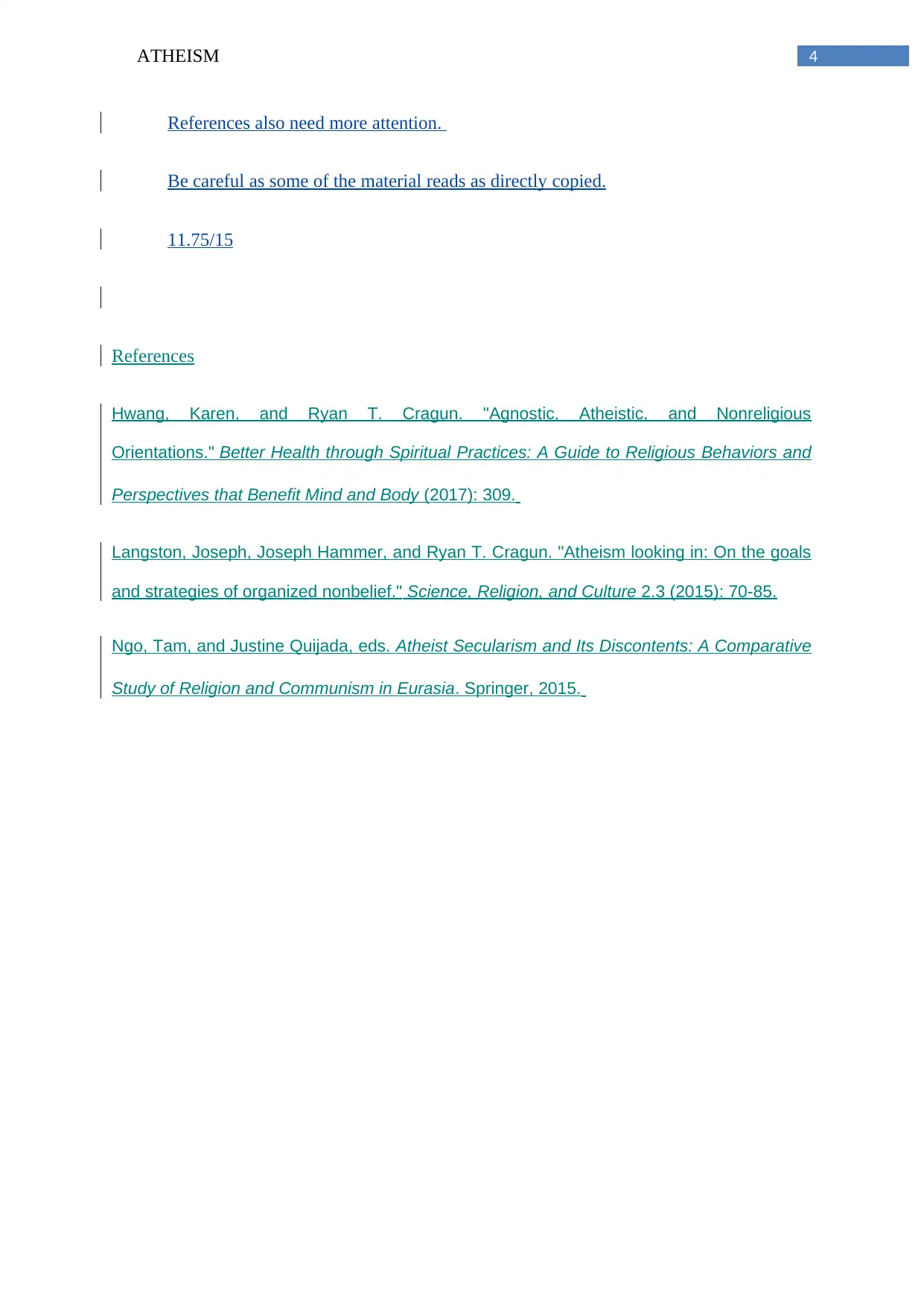
4ATHEISM
References also need more attention.
Be careful as some of the material reads as directly copied.
11.75/15
References
Hwang, Karen, and Ryan T. Cragun. "Agnostic, Atheistic, and Nonreligious
Orientations." Better Health through Spiritual Practices: A Guide to Religious Behaviors and
Perspectives that Benefit Mind and Body (2017): 309.
Langston, Joseph, Joseph Hammer, and Ryan T. Cragun. "Atheism looking in: On the goals
and strategies of organized nonbelief." Science, Religion, and Culture 2.3 (2015): 70-85.
Ngo, Tam, and Justine Quijada, eds. Atheist Secularism and Its Discontents: A Comparative
Study of Religion and Communism in Eurasia. Springer, 2015.
References also need more attention.
Be careful as some of the material reads as directly copied.
11.75/15
References
Hwang, Karen, and Ryan T. Cragun. "Agnostic, Atheistic, and Nonreligious
Orientations." Better Health through Spiritual Practices: A Guide to Religious Behaviors and
Perspectives that Benefit Mind and Body (2017): 309.
Langston, Joseph, Joseph Hammer, and Ryan T. Cragun. "Atheism looking in: On the goals
and strategies of organized nonbelief." Science, Religion, and Culture 2.3 (2015): 70-85.
Ngo, Tam, and Justine Quijada, eds. Atheist Secularism and Its Discontents: A Comparative
Study of Religion and Communism in Eurasia. Springer, 2015.

5ATHEISM
Reference: Works Cited
Clark, Kelly James. "Atheism and Inferential Bias.", 2017.
Whitmarsh, Tim. Battling the gods: Atheism in the ancient world. Vintage, 2016.
Cover page and headers are in APA format. References and citations are in MLA format.
Reference: Works Cited
Clark, Kelly James. "Atheism and Inferential Bias.", 2017.
Whitmarsh, Tim. Battling the gods: Atheism in the ancient world. Vintage, 2016.
Cover page and headers are in APA format. References and citations are in MLA format.
⊘ This is a preview!⊘
Do you want full access?
Subscribe today to unlock all pages.

Trusted by 1+ million students worldwide
1 out of 6
Your All-in-One AI-Powered Toolkit for Academic Success.
+13062052269
info@desklib.com
Available 24*7 on WhatsApp / Email
![[object Object]](/_next/static/media/star-bottom.7253800d.svg)
Unlock your academic potential
Copyright © 2020–2026 A2Z Services. All Rights Reserved. Developed and managed by ZUCOL.

